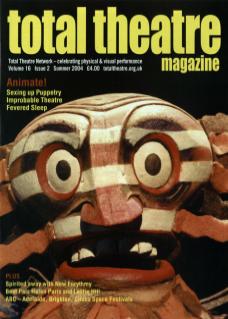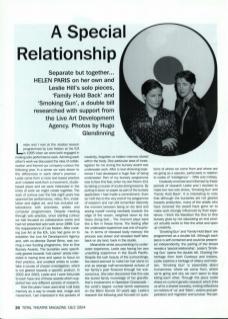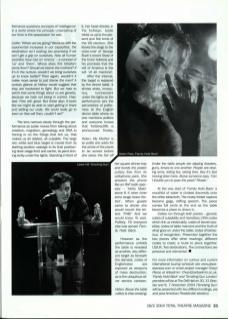Leslie and I met at the Jezebel season programmed by Lois Keidan at the ICA in 1995 when we were both engaged in making solo performance work. Admiring each other's work we discussed the idea of collaboration and formed our company curious the following year. In a sense we were drawn to the differences in each other's practice – Leslie came from a more text-based practice and I created work from a movement, studio-based place and we were interested in the kinds of work we might create together. The work of curious over the last eight years has spanned live performance, video, film, installation and digital art, and has included collaborations with scientists, artists and computer programmers. Despite meeting through solo practice, since starting curious we had focused on collaborative works and had not presented solo work since 1999. Cue the reappearance of Lois Keidan. After curating Live Art at the ICA, Lois had gone on to establish the Live Art Development Agency and, with co-director Daniel Brine, was running a new funding programme, One to One Bursary Awards. The bursaries were specifically geared towards 'mid career' artists interested in having time and space to focus on their practice, and enabled artists to undertake a course of chosen investigation, which is not geared towards a specific product. In 2002 and 2003, Leslie and I were fortunate to each have one of these awards which supported two very different periods of research.
Over the years I have used what I call body memory as a way to create text, image and movement. I am interested in the pockets of creativity, forgotten or hidden memory stored within the body. One particular area of investigation for me during the bursary award was underwater work. After a near-drowning experience I had developed a huge fear of being underwater. Part of my bursary programme was to face this fear, enter my own Room 101 by taking a course of scuba diving lessons. By putting it down on paper as part of the bursary application I had made a commitment. Even so I left this to the very end of my programme of research and can still remember distinctly the moment between being on dry land and seeing myself moving inevitably towards the edge of the ocean, weighted down by the heavy diving belt... The moment plays back like a film in freeze frame. The feeling after the underwater experience was one of euphoria. In terms of released body memory the process was slower and revealed itself later, back on dry land, back in the studio.
Meanwhile whilst documenting my underwater experience, Leslie was having her own unsettling experience in the South Pacific. Despite the lush beauty of the surroundings, the island seemed to make her hair stand on end as strange half-remembered echoes of her family's past flickered through her subconscious. She later discovered that this was the buried family knowledge of her grandfather's involvement in Operation Crossroads – the world's largest nuclear bomb explosions on the Bikini Islands 50 years ago. Leslie's research the following year focused on questions of where we come from and where are we going as a species, particularly in relation to codes of 'intelligence' – DNA and military.
Creatively enriched and informed by these periods of research Leslie and I decided to make two new solo shows, Smoking Gun and Family Hold Back. It is interesting to note that although the bursaries are not geared towards production, many of the artists who have received the award have gone on to make work strongly influenced by their experience. I think the liberation the One to One bursary gives by not stipulating an end product actually works to free the artist and open up creativity.
Smoking Gun and Family Hold Back are programmed as a double bill. Although each piece is self-contained and could be presented independently, the pairing of the shows reveals a 'special relationship'. Leslie's Smoking Gun opens the double bill. Charting her heritage from both Cowboys and Indians, Leslie explores a heritage of villainy and heroism. Smoking Gun is essentially about humanness: where we come from, where we're going and why we can't seem to stop killing each other. Through the piece Leslie draws on current genetic research which links us all to a shared ancestry, inviting reflections on notions of 'us' and 'them', victims and perpetrators and migration and survival. The performance questions concepts of ‘intelligence' in a world where the principle undertaking of our time is the preparation for war:
Leslie: 'Where are we going? Because with the exponential increases in our capacities, the destination isn't looking too promising if we can't get a grip on ourselves. Now all human societies have had an “enemy” – a concept of “us” and “them”! Where does this tribalism come from? Should we blame the mothers? If it's in the nurture, couldn't we bring ourselves up to know better? Then again, wouldn't it make more sense to just blame the men? A cursory glance at history would suggest that they are hardwired to fight. But we hate to admit that some things about us are genetic, because we hate not being in control. Fate: bad. Free will: good. But these days it looks like we might be able to start getting in there and editing our code. We could really go to town on free will then, couldn't we?'
The lens narrows slowly through the performance as Leslie moves from talking about creation, migration, genealogy and DNA to honing in on the things that link us, that make us all related, all culpable. The large red, white and blue target is moved from its starting position upstage to its final positioning down stage front and centre, its paint shining sickly under the lights. Standing in front of it, her head directly in the bullseye, Leslie takes us up to the present and the brink of the US election. She leaves the stage to the voice-over of George Bush's recent State of the Union Address and his promises that the will of America is the will 'of all mankind'.
After the interval, the target is replaced by the dinner table. It shines white, innocuous, luminescent under the lights as the performance airs the perversities of politeness at the English dinner table where no one mentions politics and everyone knows that Trotterscliffe is pronounced Trosley.
Helen: My Mother is so polite she waits for the whole of the plane to be served before she takes the foil off her square dinner tray and bursts the plastic cutlery free from its cellophane pack. She answers the phone like an RAF radio operator – ‘Hello Maidstone 6 4 niner niner echo tango bravo foxtrot'. When guests came to dinner she would mouth the letters 'FHB!’ And we would know. To wait. Politely. Till everyone else was served. Family. Hold. Back.
However, as the performance unfolds the table is revealed as another, very different target as beneath the damask, codes of Englishness are exposed as weapons of mass destruction, as is the ubiquitous silver service canteen.
Helen: Above the table cutlery is criss-crossing. Under the table people are slipping dossiers, guns, knives to one another. People are dealing arms, telling lies, taking lives. Boy it's fast moving down here. Above someone says, 'Can I trouble you to pass the peas? Please.'
At the very start of Family Hold Back a mouthful of water is choked discreetly onto the white tablecloth. The neatly folded napkins become gags, stifling speech. The piece comes full circle at the end as the table becomes a place to drown in.
Codes run through both pieces – genetic codes of culpability and hereditary, DNA codes which link us inextricably; codes of secret societies; codes of table manners and the truth of what goes on under the table; codes of behaviour, of recognition. Presented together the two pieces offer other readings: different codes to crack; a route to piece together. US/UK. Two destinations. The connections are personal and elemental.
For more information on curious and current international touring schedule see www.placelessness.com or email project manager Cheryl Pierce at Artsadmin: Cheryl@artsadmin.co.uk
Family Hold Back and Smoking Gun’s London premiere will be at The Drill Hall on 30, 31 October and 6, 7 November 2004 (Smoking Gun will be presented with two different endings, pre and post American Presidential election).


